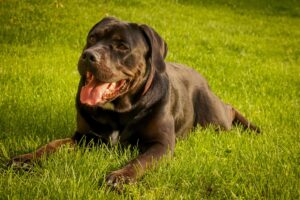
Malignant Hyperthermia
Canine stress syndrome
MH
It is a congenital disorder of skeletal muscle which is manifested by the significant increase in temperature (hyperthermia) up to 45°C, accelerated and irregular heart rate (tachycardia and arrhythmia), hyperventilation, muscle rigidity and may result in renal failure and death...
Degenerative Myelopathy
DM
It is a neuromuscular disease causing a gradual muscle weakness on the hindlimb and back, which is manifested by poor coordination of movements, cramped and asymmetric walking, or incontinence.
Dental-skeletal-retinal anomaly
DSRA
Dental skeletal retinal anomaly (DSRA) is an inherited genetic syndrome that affects dogs of the Cane Corso breed. The disease is clinically characterized by skeletal abnormalities, progressive retinal involvement leading to loss of vision, and dental imperfections...
Neuronal ceroid lipofuscinosis 1
Batten disease
NCL1
Neuronal ceroid lipofuscinosis 1 (NCL1) is a rare genetic disorder observed in one individual of Cane Corso breed...




